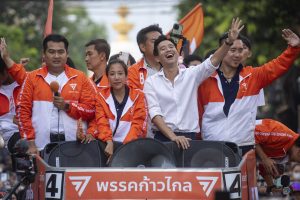When Thai voters went to the polls on May 14, they registered an unambiguous vote for change. The progressive Move Forward Party (MFP) emerged in first place, winning 151 seats in the 500-seat House of Representatives. Together with the strong showing of the Pheu Thai Party, the electoral vehicle of the popular exiled former Prime Minister Thaksin Shinawatra, the result was a decisive public rebuke of the military establishment that has ruled Thailand since the military coup of 2014.
However, the MFP and its leader, Pita Limjaroenrat, face numerous obstacles to forming Thailand’s next government. These include the power of the unelected Senate, which will vote to select the next prime minister later this month, and the ongoing Election Commission investigation into Pita’s eligibility to stand for office.
Even if the MFP is allowed to take power, it faces an uphill battle in implementing its ambitious policy agenda. The past two decades offer numerous examples of how conservative forces have manipulated the legal system, and launched two coups d’etat, to remove governments that were perceived as threatening.
Duncan McCargo, a professor of political science at the University of Copenhagen and the director of the Nordic Institute of Asian Studies, was the author of a book about the Future Forward Party, the MFP’s predecessor, which performed well at the 2019 election before being disbanded by the courts on a technicality in early 2020. Late last month, he spoke with The Diplomat about the remarkable election result, what it says about recent changes in Thai politics, and some possible paths forward
In an article for Nikkei Asia immediately after the election, you wrote that you were skeptical about Pita Limjaroenrat’s confidence that his party would prevail, as were most observers of Thai politics. In retrospect, what do you think accounts for the Move Forward Party’s victory?
I talked to Pita in Udon Thani on April 17, and at that point the Pheu Thai landslide narrative was still really widespread. A combination of things happened during the final three weeks of the election that saw the tide turn.
The broadly oppositional voter sentiment and popular desire to see an end to the rule of “the two uncles,” generals Prayut and Prawit, was growing stronger by the hour. So the choice was the MFP or PTP [Move Forward Party or Pheu Thai Party].
But Pheu Thai increasingly struggled to communicate effectively on two crucial fronts. First, who was their real prime ministerial candidate, Paetongtarn (Thaksin’s daughter) or Srettha? At a certain point, people became tired of Thaksin’s crass attempts to have it both ways by playing up Paetongtarn’s candidacy in the provincial heartlands, and offering up Srettha to the Bangkok middle classes.
A second problem was the persistent rumor that Thaksin had already done a deal with Prawit, under which Pheu Thai would form a coalition government, probably fronted by one of the generals, and Thaksin would be allowed to return home from Dubai, with all the legal cases against him dropped. Pheu Thai never convincingly rebutted this idea, and indeed Thaksin tweeted on May 9, right before the election, that he would be home in time for his birthday on July 26. In the end a lot people decided voting for the MFP was the most surefire way to force the two uncles from office.

































